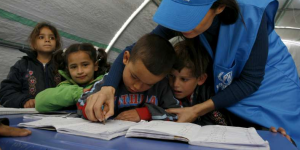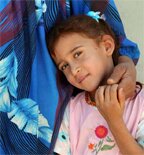
As the children enter school, often for the first time, there are some features of the classroom and school environment that will cause confusion. The children should be offered specific assistance to build the understandings expected of mainstream children.
They:
- May be unfamiliar with North American bathroom facilities and school bathroom routines.
- May need assistance to understand appropriate clothing for the weather conditions. May not own appropriate clothing.
- May not have enough food, may not understand meals and snacks and may not recognize the food offered at the school.
- Will likely be unfamiliar with school routines including standing in line, waiting for a turn, sitting on the carpet/floor, or staying in the same room for several hours.
- Will likely be unsure of the behavioural expectations in the classroom/school.
- May not understand non-verbal cues.
- Will likely lack the English to express feelings, and may act out frustration, sadness or anger in other ways
- May not understand social situations or social rules (e.g. one person speaking at a time; how to join a group of children playing together; what to do when finished).
- May not recognize or know how to use writing tools, paint brushes, scissors and other school tools.
- May be unfamiliar with technology in the classroom/school such as computers, projectors, switches, etc.
- May take items from others, not understanding what is shared property and what is not.
- May be unfamiliar with safety practices related to buses, traffic, strangers, etc.
- Parents may be unable to understand and complete standard school forms and documents, e.g. registration, waivers, fieldtrips.
- Due to cultural values, some parents may be reluctant to allow their children to participate in particular activities which may include music, physical education or off site activities.
It is helpful to provide information about the new school system to parents in plain English or in translation.
Young children having difficulties adjusting to their new situation or suffering the effects of trauma:
- May be silent at school for an extended period of time.
- May appear withdrawn, tired or uninterested.
- May have difficulties concentrating and completing tasks.
- May avoid particular activities or situations.
- May appear irritable or hyper-alert.
- May have difficulties self-regulating.
- May be preoccupied with violent events and play them out repeatedly in their play, drawings and conversations.
- May experience excessive distress upon separation/anticipation of separation from their parent/caregiver.
- May exhibit a range of behaviours associated with the effects of trauma which could occur in response to unrelated stressful situations or reminders of traumatic events.
 For more information, see also School Challenges in Student Background section. See also Refugee Journey: Social Emotional Perspective.
For more information, see also School Challenges in Student Background section. See also Refugee Journey: Social Emotional Perspective.
Some resources for helping parents and children cope with stress and build resiliency are identified in the Links: Resources section of the Toolkit.
The Socio-Emotional Supports section of this website has extensive resources to assist school staff to understand and provide responsive interventions for children of all ages.



